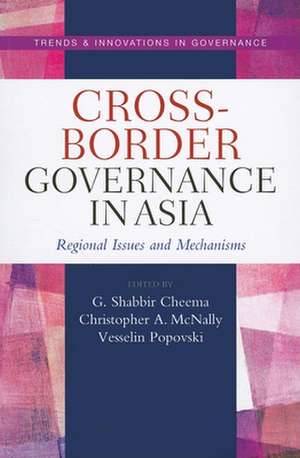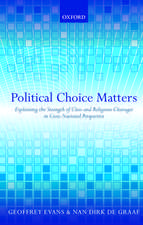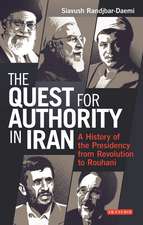Cross-Border Governance in Asia: Regional Issues and Mechanisms
Editat de G. Shabbir Cheema, Christopher A. McNally, Vesselin Popovskien Limba Engleză Paperback – 8 mar 2011
Rapid globalization has led to increased flows of capital, services, ideas, information, and people between countries. As such, problems and challenges that face one nation often have a rippling impact throughout the region and globally. The growing list of cross-border issues cannot be resolved by isolated policy action at the national or subnational levels. It is essential to forge strategic alliances at the regional level that support the development of consolidated approaches for dialogue and action.
This book discusses regional governance mechanisms and institutional arrangements to respond to emerging cross-border issues and trends in Asia and the Pacific, such as the movement of people including refugees and illegal migrants, regional trade integration for human development, effective and efficient water management, human trafficking, and health issues focusing on infectious disease surveillance and response.
While examining the impact of governance on these issues, the book considers these questions: What are the key cross-border governance issues in Asia? What are the regional governance mechanisms to cope with these issues? How effective are the regional mechanisms and national institutional capacities in responding to these issues? What factors contribute to the success or failure of the mechanisms for regional cooperation?
Contributors include Graeme Hugo (University of Adelaide), William J. Long (Sam Nunn School of International Affairs), Mike Douglass (University of Hawaii—Manoa), Taeho Bark (Seoul National University), and Mely Caballero-Anthony (S. Rajaratnam School of International Studies).
This book discusses regional governance mechanisms and institutional arrangements to respond to emerging cross-border issues and trends in Asia and the Pacific, such as the movement of people including refugees and illegal migrants, regional trade integration for human development, effective and efficient water management, human trafficking, and health issues focusing on infectious disease surveillance and response.
While examining the impact of governance on these issues, the book considers these questions: What are the key cross-border governance issues in Asia? What are the regional governance mechanisms to cope with these issues? How effective are the regional mechanisms and national institutional capacities in responding to these issues? What factors contribute to the success or failure of the mechanisms for regional cooperation?
Contributors include Graeme Hugo (University of Adelaide), William J. Long (Sam Nunn School of International Affairs), Mike Douglass (University of Hawaii—Manoa), Taeho Bark (Seoul National University), and Mely Caballero-Anthony (S. Rajaratnam School of International Studies).
Preț: 279.44 lei
Nou
Puncte Express: 419
Preț estimativ în valută:
53.48€ • 55.63$ • 44.15£
53.48€ • 55.63$ • 44.15£
Carte tipărită la comandă
Livrare economică 15-29 aprilie
Preluare comenzi: 021 569.72.76
Specificații
ISBN-13: 9789280811933
ISBN-10: 9280811932
Pagini: 300
Dimensiuni: 152 x 229 x 20 mm
Greutate: 0.5 kg
Editura: Brookings Institution Press
Colecția United Nations University Press
ISBN-10: 9280811932
Pagini: 300
Dimensiuni: 152 x 229 x 20 mm
Greutate: 0.5 kg
Editura: Brookings Institution Press
Colecția United Nations University Press
Notă biografică
G. Shabbir Cheema is director of the Asia-Pacific Governance and Democracy Initiative and a senior fellow at the East-West Center, Hawaii. Christopher A. McNally is a fellow at the East-West Center.
Vesselin Popovski is senior academic program officer and head of section for peace and security in the Institute for Sustainability and Peace at the United Nations University.
Vesselin Popovski is senior academic program officer and head of section for peace and security in the Institute for Sustainability and Peace at the United Nations University.
Descriere
Rapid globalization has led to increased flows of capital, services, ideas, information, and people between countries. As such, problems and challenges that face one nation often have a rippling impact throughout the region and globally. The growing list of cross-border issues cannot be resolved by isolated policy action at the national or subnational levels. It is essential to forge strategic alliances at the regional level that support the development of consolidated approaches for dialogue and action.
This book discusses regional governance mechanisms and institutional arrangements to respond to emerging cross-border issues and trends in Asia and the Pacific, such as the movement of people including refugees and illegal migrants, regional trade integration for human development, effective and efficient water management, human trafficking, and health issues focusing on infectious disease surveillance and response.
While examining the impact of governance on these issues, the book considers these questions: What are the key cross-border governance issues in Asia? What are the regional governance mechanisms to cope with these issues? How effective are the regional mechanisms and national institutional capacities in responding to these issues? What factors contribute to the success or failure of the mechanisms for regional cooperation?
Contributors include Graeme Hugo (University of Adelaide), William J. Long (Sam Nunn School of International Affairs), Mike Douglass (University of Hawaii—Manoa), Taeho Bark (Seoul National University), and Mely Caballero-Anthony (S. Rajaratnam School of International Studies).
This book discusses regional governance mechanisms and institutional arrangements to respond to emerging cross-border issues and trends in Asia and the Pacific, such as the movement of people including refugees and illegal migrants, regional trade integration for human development, effective and efficient water management, human trafficking, and health issues focusing on infectious disease surveillance and response.
While examining the impact of governance on these issues, the book considers these questions: What are the key cross-border governance issues in Asia? What are the regional governance mechanisms to cope with these issues? How effective are the regional mechanisms and national institutional capacities in responding to these issues? What factors contribute to the success or failure of the mechanisms for regional cooperation?
Contributors include Graeme Hugo (University of Adelaide), William J. Long (Sam Nunn School of International Affairs), Mike Douglass (University of Hawaii—Manoa), Taeho Bark (Seoul National University), and Mely Caballero-Anthony (S. Rajaratnam School of International Studies).










